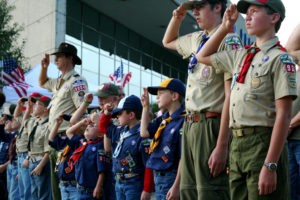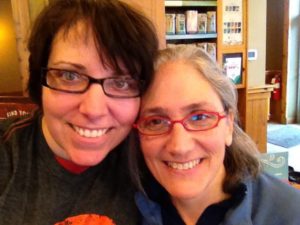 Scout Oath
Scout Oath
On my honor, I will do my best
To do my duty to God and my country and to obey the Scout Law;
To help other people at all times;
To keep myself physically strong, mentally awake and morally straight.
Scout Law
A Scout is: trustworthy, loyal, helpful, friendly, courteous, kind, obedient, cheerful, thrifty, brave, clean, and reverent.
Boy Scouts Adult Membership Policy
The adult applicant must possess the moral, educational, and emotional qualities that the Boy Scouts of America deems necessary to afford positive leadership to youth. The applicant must also be the correct age, subscribe to the precepts of the Declaration of Religious Principle, and abide by the Scout Oath or Promise, and the Scout Law. While the BSA does not proactively inquire about the sexual orientation of employees, volunteers, or members, we do not grant membership to individuals who are open or avowed homosexuals or who engage in behavior that would become a distraction to the mission of the BSA.
***
When I was eight-years-old I had three serious crushes: Mikhail Baryshnikov, Gene Kelly, and Sidney Poitier. Mikhail could practically fly, Gene danced in puddles, and Sidney… Sidney was intensely radiant and righteous. Watching the ironing scene in Guess Who’s Coming to Dinner, my eight-year-old eyes took in the stunning body that housed that radiant soul. I confessed my crush to the privacy of my diary.
Three years later I was a white-skinned Jewish sixth grader at a sleepover in Bible-belt and racially divided Missouri, and I responded to a friend’s giggle-whisper, “Who do you like?” with “Sidney Poitier.” Being a girl and having a crush on Sidney didn’t technically make me queer. But given my friends’ reactions, that midnight confession was my first experience of not being exactly “straight.” It was compassionately suggested I try to develop feelings for Michael J. Fox or one of the New Kids. “You just can’t have a crush on a black man.”
They believed me fixable. I knew I wasn’t broken.
***
In ways much more subtle than Sidney, my partner is radiant and righteous. She and I are all-weather dancers. Side-by-side for three years we have walked together through experiences that make flying across a stage look easy. I have a J.D. I am a teacher, advisor, and youth worker. I had a bone marrow transplant. I love being where there are more trees than people. I am better at leading than joining. I credit my grandmother for my dedication to advocating for comprehensive sex education. I’ve been a vegetarian for twenty-nine years. My identities of Jewish, woman, daughter, partner, and friend are inseparable.
I believe we come out to each other every time we share something personal that potentially makes us vulnerable. For me, being “out” is the experience of living my life. In that way, I have always been “out.” I don’t have a single coming out story. I have a life of stories.
I admit I have an inherent distrust of any organization that prefers secrets to openness – that prefers our real selves stay packed away somewhere, whether that somewhere is a diary, an oversized sweatshirt, a military uniform, or a closet.
Therefore, I commend BSA’s process for considering the change to their membership policy. They received feedback from over 200,000 people and conducted the most comprehensive and impressive talking and listening exercise in Scouting’s history. In April, the Executive Committee of the Boy Scouts of America had drafted a resolution that maintained its current membership policy for all adult leaders but stated that youth “may not be denied membership in the BSA on the basis of sexual orientation or preference alone” because “[y]outh are still developing, learning about themselves and who they are, developing their sense of right and wrong, and understanding their duty to God to live a moral life.”
For BSA, the distinction between youth and adults seems to be that youth have time to outgrow their queerness. As one of the teen Eagle Scouts I spoke with explained, “the BSA leadership does not understand that sexual identity – that identity – isn’t a phase.”
The BSA website goes on to assure us that because all sexual conduct is strictly prohibited in Scouting, youth will not be introduced to “homosexuality” by other youth. I wonder what happens when sixth graders in a tent talk about their crushes. I was quite clear with my friends at that sleepover that my parents would openly support my dating a Black man when I was old enough for dating. As a sixth grader I also knew they would support my dating a woman. Wonderfully, I have had opportunities to prove myself right on both counts.
***
 If one of my Mount Zion kids asked me if I had a husband, I do not believe it would be inappropriate to respond honestly, “No. I have a partner. Her name is Liddy.” Boy Scouts of America has decided, however, that my naming the person with whom I am in a holy, committed, and mature relationship that is supported by my faith community makes me an “avowed homosexual,” and a “distraction to the mission of BSA.”
If one of my Mount Zion kids asked me if I had a husband, I do not believe it would be inappropriate to respond honestly, “No. I have a partner. Her name is Liddy.” Boy Scouts of America has decided, however, that my naming the person with whom I am in a holy, committed, and mature relationship that is supported by my faith community makes me an “avowed homosexual,” and a “distraction to the mission of BSA.”
***
Before the vote more than 500 rabbis and cantors from forty-six states added their names to a letter sent to the National Council of the BSA seeking “to to add their moral voices to the effort urging the BSA to end its policy of excluding gay scouts and scout leaders.”
I appreciate that they asserted that the ban discriminates, that it “causes real harm to gay youth, adults, and their families,” and that they were concerned about bullying and harassment. I am disappointed that they did not also write that the ban causes real harm to youth who do not now identify as gay – and may never identify as gay; it causes harm to all of us and our families; and it means that not only will our children be more likely to be bullied, but also that if we don’t openly talk about our identities and supporting people of all identities, our children are more likely to become bullies. I appreciate that they raised the question of how we can teach service to a community “when that community excludes our friends, family members and neighbors,” but I am disappointed that they did not also add, “…it excludes us.” After all, if I am truly an ally, then I am also excluded when those with whom I have allied myself are excluded. As Jews especially, we should know that lesson as well as anyone.
Of course, I am also glad so many of our Jewish clergy wrote and signed onto that letter and feel similarly to one 11th grade Eagle Scout who told me, “I’m proud that my community has stepped up and taken action on issues that affect my community, as well as a national community. Scouting being a fundamentally religious organization, I think it’s important that our religious leaders give their input.”
A recent college graduate who left Scouts at an early age agrees: “I think it’s great!” he said, referring both to the community letter and also to the personal letter Rabbi Spilker wrote as an Eagle Scout. This former Scout feels these actions demonstrate a real commitment to inclusivity and advocacy.
The Scouts and former Scouts with whom I spoke also agree that the ban on “homosexual” leaders is at the very least problematic.
“It’s problematic because ‘allowing’ gay Scouts implies they weren’t there to begin with and weren’t a part of the organization at all. True, you could not be an openly queer Scout, so in that respect queer Scouts were not Scouts. But they still existed. There are also queer leaders in the Scouts, we just don’t know who they are. The truth is, the organization has always allowed them, just never ‘accepted’ them.”
***
A Northern Star Council Eagle Scout assured me that in his council there are openly gay leaders. When I asked if they were able to attend national events he responded, “I’m sure they could go to national events, but in order for real change to happen we need to actually teach kids to be open. That’s especially hard because part of the law is to be obedient. I think everyone would be better off with less obedience. Please don’t quote me by name on that, though!” He continued, “BSA has been known to excommunicate scouts who speak badly about Scout values.”
I have been struggling with those last words since I heard them. I’ve looked back at the Oath and the Law and questioned how it can be that an Eagle Scout fears that voicing his opinions courteously, opinions based on deeply-held values including his sense of duty to God, as the brave leader BSA has helped him become, with the intention of helping the Scouts – to which he is loyal – be a better organization could mean his excommunication from Scouts. That is one intense chilling effect to speech.
In the end, the resolution to lift the ban against “homosexual” youth passed by a 61% majority. It is out – so to speak – as of January 1, 2014. The ban against “homosexual” leaders was not considered.
***
Boy Scouts won’t work for me, so I’m developing my own oath. I can just hear Sidney’s voice blending with mine as we read together.
Here is my first draft:
“On my honor, I will do my best To live with integrity, To advocate continually for a separation between God and country, To question those who expect our obedience and guide youth to develop their own values and find their own voices and speak their own truths, To help other people when doing so does not cause harm to myself, and To remember that real strength is living in the world as one’s self and working to make room for others to do the same.”
(Photo: stevendepolo)




What a brilliant essay! Amy Ariel should be published regularly in national media. She’s up there with the best columnists.